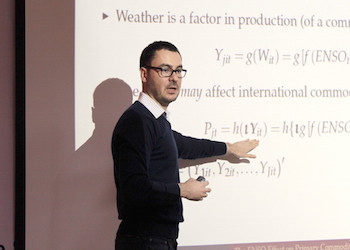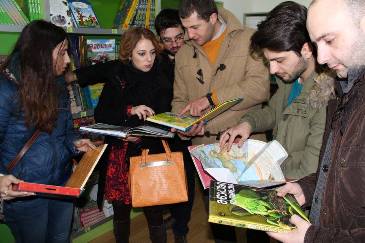Rises and Falls in Primary Commodity Prices: Blame it on ENSO or Leave Them Kids Alone?
- Details

On January 22, Dr. David Ubilava, from the the University of Sydney, led a seminar on the subject of his recent paper, "Rises and Falls in Primary Commodity Prices: Blame it on ENSO or Leave Them Kids Alone?"
The speaker began by introducing the essence of his research, which aims to estimate the effects of ENSO on commodity prices. ENSO is an abbreviation of El Niño Southern Oscillation, which refers to the effects of a band of sea surface temperatures that are anomalously warm or cold for long periods of time.
This process has a cyclical character and strong effect on the production and distribution of different commodities. If ENSO-related weather disturbances are synchronized across commodity producer countries, the causal relationship between ENSO and commodity price movement becomes an economic corollary; however, this causality is not always there. The strength of the linkage depends on the concentration of the primary commodities in the ENSO-affected regions, the availability of close substitutes, and the ability of producers to adapt to climate shocks in the short term.
ISET’s “Save the Trees” Initiative
- Details

Since October 2014, ISET has been regularly collecting and delivering scrap paper to Makuliteratura. Established in 2012, Makuliteratura is an organization that collects waste paper (old books, papers, magazines and newspapers) and exchanges the waste paper it receives for new books. At ISET, we noticed that our students were printing a lot of materials for assignments and course readings. Once the assignments and readings were completed, however, there was a significant amount of waste paper not being put to use. As such, last May ISET decided to begin collecting its waste paper in the School’s library and donating it to Makuliteratura.










